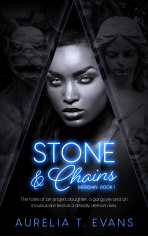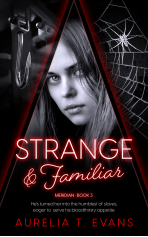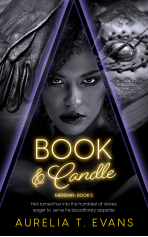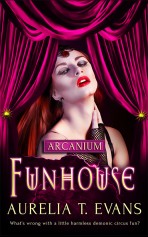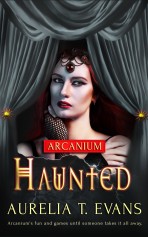Abby closed the book, glancing between her two charges. “I think that’s all for now. I’ll be back on Wednesday for chapter four. That’ll be exciting, won’t it?”
There wasn’t enough tea in the world to get her through reading aloud another two chapters, although she loved the young adult fantasy series and wished she could read it forever. Her charges, about the same age as Abby herself, never complained that they were too old for the reading material.
Abby smiled and patted the two hospital beds on either side of her. Two young women—one of them quite pregnant—reclined supine, their monitors beeping softly in a steady rhythm. Neither of them could tell her if they enjoyed the books, but it wasn’t about the stories so much as the women knowing someone was there to do more than give them sponge baths and prevent bed sores.
The pregnant woman’s baby was getting more human care than the woman herself, out of the belief that Maggie wasn’t really there anymore after the car accident that had put her in the extended care ward. Then there was Kara on Abby’s right, who had simply lost consciousness one day and never awakened, cause unknown.
Coma patients still experienced the world around them, just not in the same way that they did when conscious or even when asleep. Like infants in the womb, the lost sometimes remembered it like the shadow of a dream, but it was still something. They knew the difference between caring and concern versus the cold, clinical indifference and abandonment they often experienced in a hospital environment. Just as most people didn’t like the reminder of mortality from the elderly, they didn’t like the stark blankness of the comatose.
But Abby felt their presence in the way some sensed the passing of a ghost—except she experienced it as warmth on the back of her neck instead of a chill. And that warmth was the reason she came to the hospital several times a week in the middle of the night to read to her two friends, although they’d never formally met.
No handsome doctor was going to wake them up with a kiss. All they could really depend on within the mortal realm was divine intervention and an overworked, underpaid woman who wanted to give them some kind of connection, even though she couldn’t help them any more than that.
Abby was tired, always tired, pulled between day life and the night shift, making money and helping people. There weren’t nearly enough hours in the day for everything she needed to do, so she depended far too often on free coffee refills in twenty-four-hour restaurants. There were other things more important to her than sleep, and it was easier to get out of the house more often when her bedroom—which was actually just the storage closet under the stairs—barely held the bed, and she shared living space with two other girls who didn’t share her hours.
Still, life could be so much worse. She could be trapped in her own head like Kara and Maggie. Abby tried never to forget what she’d been blessed with. She’d been born with so many gifts, gifts she couldn’t keep to herself, even if she tried. Volunteer hours and night shifts meant she didn’t have much of a life, but Abby could live with that if she could give other people the life she didn’t allow herself.
And here in Meridian, she felt like she could finally put down some roots after these last two years of seemingly aimless wandering from city to city.
She felt like she might have finally found what she’d been looking for.
“Life could be worse,” Abby whispered into Kara’s ear before kissing her cheek. Kara’s skin was cold from the hospital air, but underneath the surface was the heat of life, and within that life, there was still hope.
She sent that hope to Maggie as well, and to Maggie’s eight-month pregnant belly and the baby within. “Stay safe.”
Abby carried mace and a switchblade in her purse to go to and from her night shift at the Cemetery Grove clinic downtown, but just because Kara and Maggie were in a bright hospital ward and supervised by security cameras didn’t mean that they were safe, even if the only thing they weren’t safe from was their own minds—what dreams and nightmares haunted them, the kind of horrors that machines couldn’t measure.
* * * *
As she left the hospital, Abby had to adjust to the darkness of three o’clock in the morning. Most people feared this time, especially in Meridian, but Abby refused to let the late hour—or early, depending on perspective—make a coward out of her.
She was used to the night. She’d kept a vampire’s hours for years now, ever since graduating from nursing school. After a while, the underworld that rose to the surface in the dark didn’t scare her so much as the crowd during the day. She kept a hand in her purse in case the wrong person came up to her, but after months in Meridian, she hadn’t been approached by anyone except a sex worker asking for ten bucks. If a person looked like she knew where she was going, the other night people didn’t bother her. And the day people walking around at night figured she was one of the night people they were supposed to avoid.
On the way to the Cemetery Grove clinic, Abby passed by the Gothic-style church of the famed Cemetery Grove itself, a sprawling plain of headstones.
Meridian was a place deeply inspired by age and wisdom, although it held neither within its city limits and had barely even been a city until about thirty years prior, when two enterprising architects—Christian spiritualist Angela Cabrera and Bartholomew Vega, a reclusive man who some said was a Satanist, others a demon worshipper and others an occultist, although no one really knew for sure—had decided to make the old outpost of a ghost town the site of their own private religious war.
Whatever deeper battles they had waged then, they’d warred more publicly with the weapons of development. Vega had built and nurtured a strong financial industry that had risen to the skies in conscious mimicry of Dallas, just a little over a hundred miles away. In the undercurrents of the mini–Wall Street of investment and private equity arose complementary booming industries of law and medicine, even a thriving media stream.
As practical as he’d been, he’d taken the black and brown glass functionality of the modern skyline and twisted it further. There were rumors of spells sewn into fiberglass, runes etched in cornerstones and keystones, secret passageways through walls and basements and parking garages, bodies and blood sacrifices soaked into the concrete foundations. Under different circumstances, the rumors might have cast Vega out of his own creation in the interest of optics, but he’d ultimately been deemed essential, a necessary economic evil.
On the other side of the aesthetic spectrum, Angela Cabrera was an accomplished artist who had established a well-regarded sculpture and architecture firm in the heart of the developing city that managed to draw a radically different element than Vega’s clientele but nevertheless made its visible mark on the city even more obviously than Vega’s aggressively functional shibboleths.
She hadn’t built all the houses of worship within the city limits—and because this was Texas, there were many, of all kinds of religions and creeds—but she’d been responsible for the designs of about eighty percent of them. She’d also provided concepts for a number of restaurants, apartment buildings and the model homes of high-end neighborhoods. Once the city had realized that her particular brand of modern Gothic was a tourism goldmine, Cabrera had gotten the last laugh when a significant number of Vega’s buildings had been remodeled with architectural details designed by her and her artistic acolytes. Because of Cabrera, Meridian became the second-weirdest large city in Texas, with an art scene that rivaled Austin, Dallas and San Antonio, especially with its Old European slant as opposed to contemporary or Spanish-colonial influences.
Even Cemetery Grove, one of the roughest neighborhoods in the city, had been touched by the ambitious, generous, artistic Cabrera hand. The cemetery was attached to the cathedral of the First United Methodist Church. Its gray marble swept in ivy whorls, the rose window lit from within and edged with statues hidden among the flora, cherubs peeking through the leaves, grander human-like angels flying among the turrets, two true cherubim on either side of the jutting, jagged steeple. And along the edge of the roof lining the length of the sanctuary, grotesques screamed, smiled and mocked above and below the gutters, although most people just called them gargoyles, whether or not they spouted water.
The cathedral was as good an example as any of Cabrera’s style, a mix of the divine and dangerous. Unlike Vega’s buildings, the rumors that followed Cabrera’s work were of hidden reliquaries and talismans, words of God written into the foundation, spells and prayers etched in secret rooms that housed valuables protected by riddles and more statues.
The cemetery itself, one of five within the city limits and definitely the biggest—which made it another popular tourist destination, in spite of the rough neighborhood—was surrounded by a wrought-iron fence designed with Cabrera’s signature whimsy—curling thorny vines threaded between the bars and tipped with spikes on the end to discourage intruders.
At one point in her life, Abby hadn’t known why anyone would want to break into a cemetery. Sure, a bouquet of flowers wasn’t cheap, but where would you resell it? Aside from that, a person couldn’t find anything more than coins and trinkets.
These days, she knew better, especially since she was the one jumping the fence.
One wouldn’t expect such a new city to have so many gravestones, but the somewhat clandestine origins of Meridian had yielded another side effect other than a roaring nightlife and eye-catching architecture. As expected with a rise in new gangs and other criminal enterprises that ran through the sewers of white-collar business, Meridian boasted an unusually high homicide and suicide rate. Armed robberies and other forms of theft, on the other hand, were unusually low.
Per her research, experts, baffled though they were, blamed the gargoyles for both.
Well, it wasn’t that simple. Some places in the world were just haunted by death. But although the gargoyles were meant to protect the city, their dark drama sometimes inspired dark extremes, self-fulfilling and self-sustaining prophecy.
The bodies had to go somewhere, and St. Theresa’s wouldn’t take the suicides. Cemetery Grove took the ones no one else wanted and sponsored its own potter’s field on the other end, which meant that, although it was attached to a Methodist church, it interred all sorts.
Abby landed on the other side of the cemetery fence. It wasn’t her first trespass. She’d learned how to avoid the finials.
What a place to call home.
Still, it was where her father lived. Now, if she could only find him.
She’d tried other cemeteries, and she was a third through this one. She wasn’t even convinced that he’d settled in a cemetery, but the way the gravestones were arranged made it easier for her to keep track of where she’d already been. If he wasn’t in a cemetery, she’d have to start bringing binoculars out with her to look at all the Cabrera-treated buildings in Meridian, and that could take nigh unto forever.
Still, she had a feeling, and following her feelings usually led her in the right direction—even if the right direction sometimes meant slowly traveling through half the country before finding what she was looking for deep in the heart of Texas, of all places.
Anywhere but Chicago would have been random, but something about Texas made it extra random to her. Still, Meridian was certainly where she’d go if she were a statue. At the very least, she’d be in good company.
She switched on her flashlight. Police didn’t come down here unless they had to. If she needed to hide, a number of mausoleums would do the trick.
Abby continued down row forty-two. She passed her dim beam back and forth, the light catching and chasing off the dramatic shadows of the grave columns and wings. In this cemetery, gargoyles guarded the columbariums and mausoleums, while angels guarded gravestones. Walking through them, especially at night and under the cloudy slate-colored sky, was like walking through time. The light passing over them gave the illusion of movement.
And sometimes it might not have been an illusion.
Most of the stone angels were women, their soft, stylized breasts pressing against classical sheet-like gowns. Abby didn’t understand why angels always seemed to be Greek. During the Renaissance, it had been de rigueur, but plenty of artistic periods had passed since then. What if a few wanted to be medieval for a change…or cyberpunk? If she were an angel, she would rather be naked than in a toga, but Cabrera hadn’t been quite that classically inspired. There was certainly an appreciation for the human form, but none of Michelangelo’s liberality. This was, after all, a church graveyard in Texas, in a country where Justice needed her breasts covered for a president’s speech.
“Think of the children,” she muttered as she passed by a child’s grave, over which draped a chubby, weeping cherub.
Her flashlight beam found a tombstone for Abigail Santana, which was the very definition of irony, because over the “In Loving Memory of” stood a male angel with wings outstretched, his gentle face like so many stone angels in the cemetery, agonized by human folly and the finality of mortality, but his hand grasped the hilt of his sheathed sword—ready to defend.
Abby stepped back, sat on the edge of the tombstone behind her and primly rested her hands in her lap.
“Hi, Daddy.”
The father she’d known was far more likely to wear board shorts and polo shirts than the partial toga draped over him now. If she’d wanted to check that it was really him, she had the last picture of all three of them together folded and slightly crumpled in her wallet—Abby eight years old and sitting on her daddy’s lap with her little shoes on Mommy’s shirt while Aunt Sharona took the photograph.
But stylized features or not, she would have known him anywhere.
She waited patiently with the flashlight beam fixed on his chest, enough to illuminate all of him.
With a sound like chalk on concrete, the angel shifted his weight, tilted his head, then opened his eyes. He was still made of smooth gray marble, early signs of ice damage in the porous areas of his skin, but the details sharpened to form the even more recognizable visage of her father’s face.
“Hi, honey.” The back of his mouth was closed-off stone, but sound came out, nevertheless. “I knew you’d find me eventually—although I would have preferred if you hadn’t been looking.”
“Are you kidding? Mom worried sick about where you went, and everyone was badmouthing you about just walking out on your wife and kid because your family didn’t think we were good enough. I know it’s all lies, but it tells on Mom. She didn’t know where you ended up. I wanted to be able to tell her.”
“Looking for me instead of focusing on school… I’m sure your mama had a few things to say about that, not to mention your gramma.”
Abby smiled wryly. “I finished school, got my nursing degree. You’re hardly one to talk about following through. Besides, shouldn’t you know what I’ve been up to, guardian angel and all?”
“Stone angels aren’t guardian angels, and guardian angels as such don’t exist. You should know better.”
Abby narrowed her eyes. “Then how’d you know everything about me those four years in that cemetery in Chicago like a decent cursed angel father?”
“Your mother visited me more often than the once-a-week trips you took. Made me seem much more omniscient than I was, and your amazement was worth the deception.”
“Okay, you look like my father, but you’re right, I should know better. I should have checked before we started.” Abby hopped off the tombstone and approached the creakily jerking angel. “When I was four years old, what did I want for Christmas and didn’t get?”
“A puppy.” His serene smile offset the carved sorrowful expression. “You were convinced Santa would bring you a puppy you wouldn’t be allergic to. You wanted to call him Patches.”
“There are labradoodles now, not that I could have one anyway. And when I was seven, what part of my body did I scrape during that bike accident?”
The angel laughed. “I believe that would be your floral-clad buttocks. I had to carry you home in my arms with my jacket over you so no one would see your underpants.”
“You are a monster,” she said, “but you’re definitely my dad.”
A demon with knowledge of her family deliberately trying to impersonate her father could conceivably know those details, but that was an awful lot of trouble for a demon to go through for little old her.
“You’re too easily pleased,” the angel replied, as though he knew the direction of her thoughts. “But how about this? You were born with a caul, and your mother turned to me with accusation in her eyes, screaming why her daughter didn’t have a face. I couldn’t stop her crying when the doctors pulled off the caul and revealed you to be perfectly, beautifully human.”
Abby lowered her eyes. Mama had told her that story when Abby was seventeen, about to go to college and start looking for her father during breaks. The story her father shared sounded more familiar than how her mother had explained it. She thought her dad might have told it as a fairy tale when she was a child, more fanciful at the time, in a tale about a princess and a dragon.
“I knew you would look for me, and I knew you were coming.” Her father eased himself down to sit on his stone, where Abby tentatively joined him. “Not you, specifically, but that someone was searching the cemetery for a specific angel. I sensed it might be you, through the part of me that is you.”
He gently stroked her hair. He had to compensate for the hard stone of his hand by not petting too close to her scalp, with none of the warmth or dexterity of the father she remembered.
“How’d you know someone was looking?” she asked.
“Like people, I only know what I hear, and like other stone angels, I only hear as far as other stone angels whisper. I know about grave robberies, family drama at burials, church scandals, grief, gifts to the dead, pranks played by irreverent children, but only because there are so many of us here and we’re all desperate for whispered entertainment in the evening.”
“I’ve never heard them whispering,” Abby said.
“Because they don’t whisper when you’re here. That’s how we knew you were here in the first place—because we couldn’t hear anything.”
“So, when you become stone angels, you devolve into a quilting circle? That’s almost…cute.”
“We have nothing else. It’s fortunate that we are so many, that we can hear the doings from blocks away. We don’t even hear Our Lord anymore, only what is spoken within the walls of the church. We are otherwise locked to our foundations and must communicate like trees. It’s a lonely, trapped existence—one I didn’t want you examining too deeply at ten years old when your mother was still telling you stories of guardian angels. But you’re old enough to know now, honey.”
Not the deadbeat dad that her mother’s side of the family thought him, instead a man with a stone heart and an angel’s wings, a man who Abby remembered through the haze of daughterly nostalgia and her mother’s bitterness. Her mother didn’t hate him for disappearing on her, but she could never quite conceal her pain that her time with him had been cut so short, even if she’d known it was coming.
It had taken Abby well into her early twenties to understand that her father’s capacity for love was not only greater than she could remember but that he’d also known exactly how little time he would have with the two women he loved the most. And because Abby finally understood this, she also understood her mother’s bitterness that he had fallen in love with her and that she’d fallen in love with him just as completely, when heartbreak was inevitable from the start, and he’d known that all along.
That was a grown-up thing to understand, though. For most of Abby’s life, he’d just been her daddy, a father she missed so terribly that she’d devoted most of the free time in her adult life to find him.
After all that time, she’d expected finding him to be…more. She’d thought she would be happier to see him. But since he’d disappeared, her father had transformed from the God-like angel she had believed him to be—a cross between Santa Claus and Roma Downey—to a very limited entity, all the more limited by this curse, the consequence of loving a human and coming down to be with them—and by choice, if Abby’s last name was any sign of his acceptance of those terms.
He wasn’t a god. He wasn’t even an angel anymore. He was little more than a man made of stone. It made her heart sink like one to realize that, after all her searching, she might never truly find the father who’d left her.
But although he wasn’t the man she’d expected, what hadn’t changed was how he looked at her. His eyes were carved from marble, but there was no mistaking the familiar love in them, mingled with the sadness of their last year, those visiting hours in the cemetery—the sadness of a father who didn’t want his daughter to see her idol fall.
“Getting older sucks, Dad,” she said with a sigh.
“It can’t be all bad, Abby baby.” He nudged her with a winter-cold knee. “Tell me some good news. Tell me about what you’re doing with this nursing degree. Tell me how your mother is. Tell me if you have a nice boy in your life. I want to hear everything. Not all at once, although I wish we could. Maybe in daylight so that I can see you better, even if I can’t reply. Just visit me until you have to leave again. That’s all I ask. I’ve missed you so much, my girl.”
“Well, you don’t have to miss me anymore. I work at the clinic just over there, actually. They’re the only ones that accommodate my hours.”
She pointed southeast, where in daylight her father might have seen the threadbare awning. She thought she caught the gleam of the OPEN sign on the window.
“You work here? You live here?”
“I’ve been a little aimless since graduation, but yes, I signed my first six-month lease with some girls on a house that probably needs fumigating—”
“You can’t live here.”
Abby raised the light to the darkened expression on her father’s face. “What?”
“You can’t live here. I would never have allowed such a thing to come to pass.” His stone brows drew closer together, and he returned his hand to the hilt of his sword.
“Well, at a certain point, you wouldn’t have been able to stop me.”
He’d been out of her life for fourteen years, talking to her for less than fourteen minutes, and he already thought he could tell her what she could do and how to live. But he’d missed the parts of her life when he could still do that.
“I’m not joking, Abby. This city is a dangerous place.”
“Spare me,” Abby said. “Aunt Sharona already gave me the ‘cities are dangerous’ talk when I decided to live in the UChicago dorm.”
“Not cities. This city. Meridian. The city of the war between worlds. This is not a good place. It is a center of spiritual warfare that started long before the architects, and I won’t have my daughter caught in the crossfire between demons, humans and the Powers. Abby, return to your mother. Live in Baghdad or Benghazi—anywhere but here, where all the gates are open and all the gloves are off. Don’t stay.”
“I told you, Daddy, I have a lease—and a job that I actually enjoy, even though it takes two years off my life every month I do it.”
“Break the lease and find another job. This is no place for a sweet girl like you. I don’t want to be trapped here, unable to help, while my Abby exposes herself to this corruption.” Her father rose to his full height, pulling the sword halfway from its sheath in preparation for battle, even though he couldn’t tear himself from the stone.
Abby set down the flashlight to stand as well, crossing her arms, although she wasn’t quite as intimidating as an avenging angel, even one who could only move his limbs as fast as an arthritic tortoise. “I’ve already been exposed—side effect of my work. And I wouldn’t go as far as to call myself sweet. Altruistic, maybe, although saying so just took ‘modest’ off the table. But as they say down here, I ain’t going nowhere.”
“Abby, I’m not joking. I don’t want you anywhere near here. Every night you breathe its air, the greater the risk that you will cross paths with those who would take your life—or worse. Don’t stay, or so be it, I’ll…”
“You’ll what? Brandish your sword and threaten to call my mother?” Abby picked up her purse from where she’d propped it against the gravestone, then slung it over her shoulder. “Look… I’m not some innocent flower anymore, Dad. I know that’s not what you want to hear, but you couldn’t protect me, even if you wanted to. I’ve seen some of what this city has to offer, and I’ve seen worse elsewhere, okay?”
“Then you haven’t seen what this city truly has to offer.”
She retrieved the flashlight. “I think it’s time for me to go. I’ll try to come back when I can. I take the night shift, but at least you’ll know that I’m just a few hundred feet away four nights a week.”
“And the other three, my baby girl?” he asked, rigid where he stood.
She leaned in and stood on tiptoe to kiss his cold cheek. “Just a few hobbies. Those days, I sometimes even see the sun. I’ll be back later, yeah?”
“Abby!”
Facing away, she stared down at the amorphous darkness of her sneakers.
“I love you,” he said. “I missed you.”
“I missed you, too, Daddy.”







